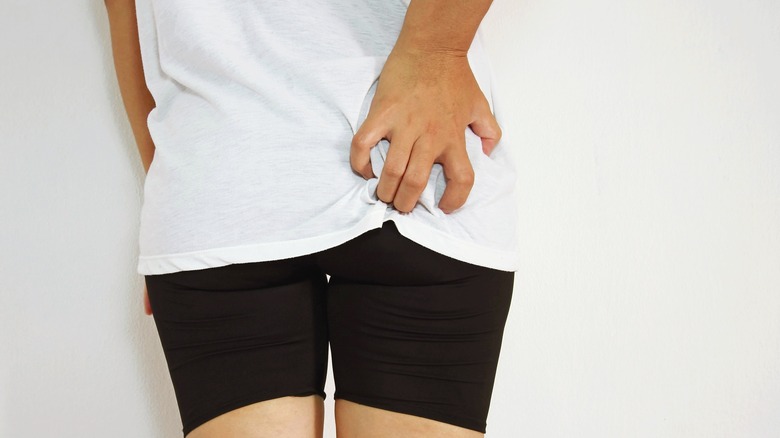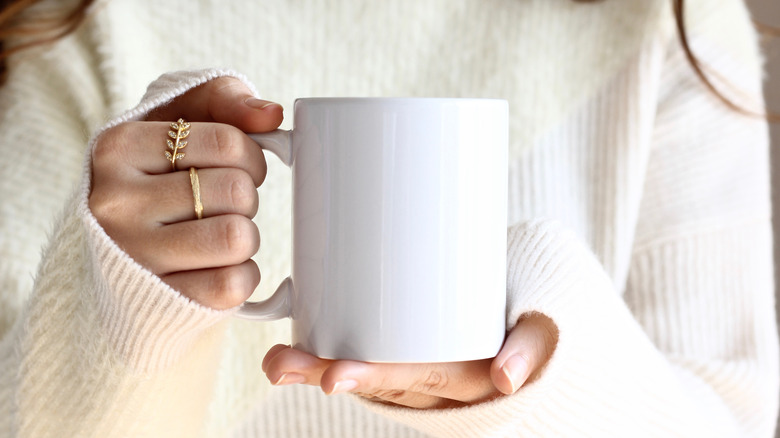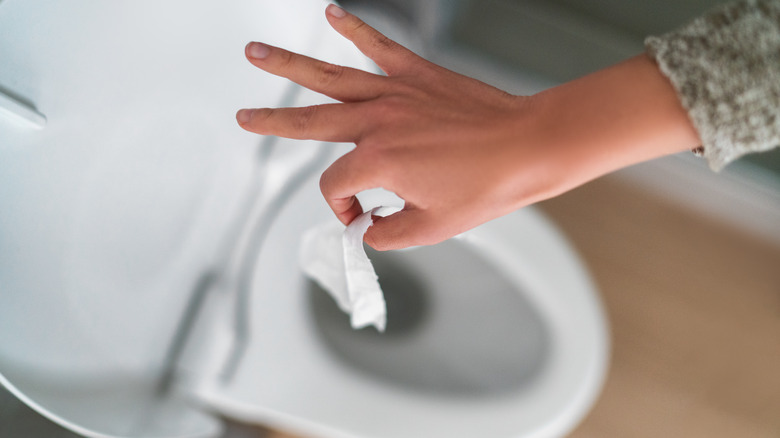What It Really Means When Your Butt Itches
Imagine taking a stroll around the park on a sunny day with a family member and then it hits you — your bottom is itching profusely. Having an itch in your lower region is often quite embarrassing, especially when you are out in public. One name for an itchy butt is called pruritus ani. It's described by Cleveland Clinic as a dermatological condition that affects the anal region causing irritation and itching. This itching can be aggravated by various lifestyle factors that may be easy enough to fix without having to make a trip to your doctor.
Additionally, while you may be tempted to scratch the itchy area of your body, it may do more harm than good. Instead, you may want to try topical treatments that promote anal self-care, ease the soreness, itchiness, or burning sensations (per Cleveland Clinic). You may also want to consider switching up your diet as the culprit may lie in what your put on your plate.
Common food irritants to lookout for
Food plays a big role in our bodies and can actually have an effect on how our bottoms feel. For instance, some foods can cause loose and frequent stools — two factors that play a part in anal itching (per Verywell Health). Some of these common food culprits include caffeinated beverages such as coffee and tea. Others include citrus, chocolate, dairy products, tomato products, alcohol, and spicy foods, according to Health.
Dr. Brian Kim, co-director of the Center for the Study of Itch at Washington University School of Medicine, tells Health, "Maybe you have an unusual diet — like it's very acidic, or you eat a lot of a certain irritant. A lot of people believe that making dietary adjustments can improve itching down there." If this is happening to you, you may want to consider keeping a food journal to track dietary culprits.
Consider hygiene and skin conditions
Additional common factors that cause itching around the anus include bathroom hygiene and skin conditions. Hygiene can be affected by the way a person wipes or what they use to wipe with, particularly after a bowel movement. Dr. Kim tells Health, "Not wiping well enough can leave behind fecal matter and moisture." Likewise, wiping too harshly or too much will also leave your anus in a state of itchiness and irritation, something health experts refer to as "overzealous hygiene."
If hygiene isn't the issue, you may have a skin condition like eczema or psoriasis. According to Dr. Ansari, assistant professor of surgery at the Donald and Barbara School of Medicine at Hofstra/Northwell in New York, tells Health about 5% to 8% of bottom itching is a result of psoriasis. Additionally, a 2014 study conducted by the International Journal of Clinical Practice found anal eczema to be a major source of discomfort for patients, but corticosteroids can help manage it.
Look to your clothing
If you still haven't found the solution to your itchy problem, clothing may be to blame. While cute and trendy, tighter-fitting clothing can cause anal itching because it's not as breathable. If you factor in sweat, it can easily exacerbate itchiness. Dr. Brian Kim tells Health, "We know that sweat can cause irritation anywhere on the body with prolonged exposure, and in this area especially it can cause a lot of itching or even a yeast infection."
Sweat combined with the friction of movement can irritate the hair follicles and skin. If this happens for an extended period, it can create a condition known as folliculitis. According to Health, folliculitis can occur all over the body (including the vagina and anus area) and shows up as tiny inflamed, red bumps. Other common issues with clothing include laundry detergent, chemical dyes, and material. If your issues still don't seem to resolve, you may want to speak with your healthcare provider to investigate further.




